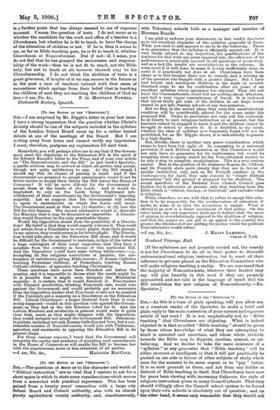[To THE EDITOR OF TED “SracrAroa.1 Sin, — I am surprised by
Mr. Diggle's letter in your last issue. I have a strong impression that the question whether Christ's divinity should be one of the subjects included in the syllabus of the London School Board came up for a rather heated debate at one of the meetings of the Board. But I am writing away from home and cannot verify my impression. I must, therefore, postpone my explanation till next week.
Meanwhile, you will perhaps allow me to say that if the Govern- ment meet the objections to the Education Bill in the spirit of Sir Edward Russell's letter to the Times, and of your own article on "The Nonconformists and the Bill" in last week's Spectator, a pacific solution may be arrived at which all parties may accept, though not quite satisfactory to any. As the Bill stands I should say that its chance of passing is small. And if the Government are prepared to accept amendments, would it not be better tactics to accept them before the Bill leaves the House of Commons ? It will be more difficult for the Government to accept them at the hands of the Lords. And it would be imprudent to rely on the Lords being frightened into withdrawal of their amendments by the Government's imposing majority. Let us suppose that the Government will refuse to agree to amendments on which the Lords will insist. The Government must in that case (1) dissolve ; or (2) lose the Bill for this Session. The second alternative would so discredit the Ministry that it may be dismissed as impossible. A Dissolu- tion would therefore be the only practicable choice.
Would the Opposition shrink from the possibility of a Dissolu- tion? My belief is that they would eagerly welcome it. They could not return from a Dissolution in worse plight than their present. In my opinion, they would return in far better plight. The Dissolu- tion would take place on the Education Bill alone, and it would be difficult for the Government to maintain, in face of the votes of a large contingent of their usual supporters, that they have a mandate from the country in favour of this particular Bill. And the Opposition would have some telling battle-cries,—e.g., trampling on the religious convictions of parents; the con- tingency of unbelievers giving Bible lessons; of Roman Catholics teaching Protestant children; of Protestants teaching Roman Catholic children ; of agnostics teaching Christianity.
These questions have never been thrashed out before the country, and it is impossible to divine what the result might be. It is possible that it might even dissipate the Ministerial majority: it is certain that it would diminish it. Free-traders with Unionist proclivities, thinking Free-trade safe, would vote against the Government, and would probably get an assurance from the Opposition leaders that Free-trade would not be assailed if the Unionists got a majority on a Dissolution on the Education Bill. Liberal Churchmen—a larger electoral force than is corn- manly supposed—would on this question vote against the Govern- ment, as they had in the late Election voted for it. And the Labour Members and secularists in general would make it quite clear that, much as they might disagree with the Opposition, they would certainly not accept the Government Bill. Denomina- tionalists, including not only Roman Catholics and Jews, but a con- siderable number of Nonconformists, would join with Unitarians, agnostics, and secularists in opposing the Education Bill in its present shape.
For these various reasons, I trust that the Government will recognise the equity and prudence of accepting such amendments in the House of Commons as will enable the Bill to become law with the acquiescence, more or less reluctant, of all parties.








































 Previous page
Previous page